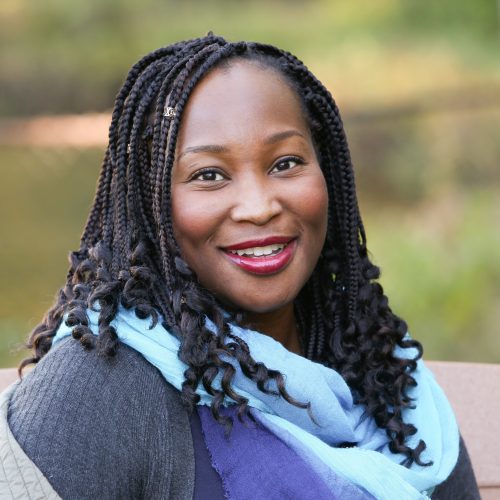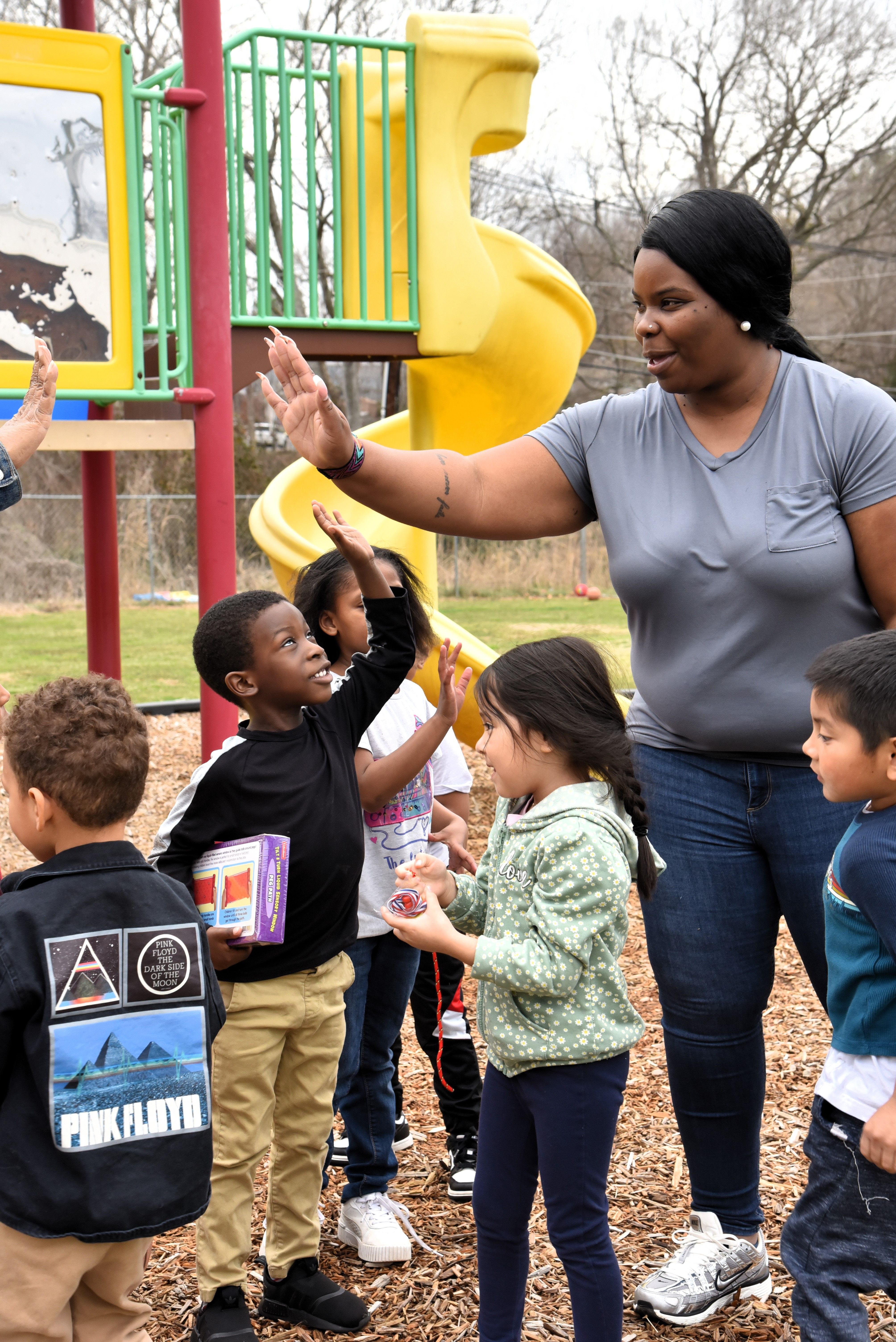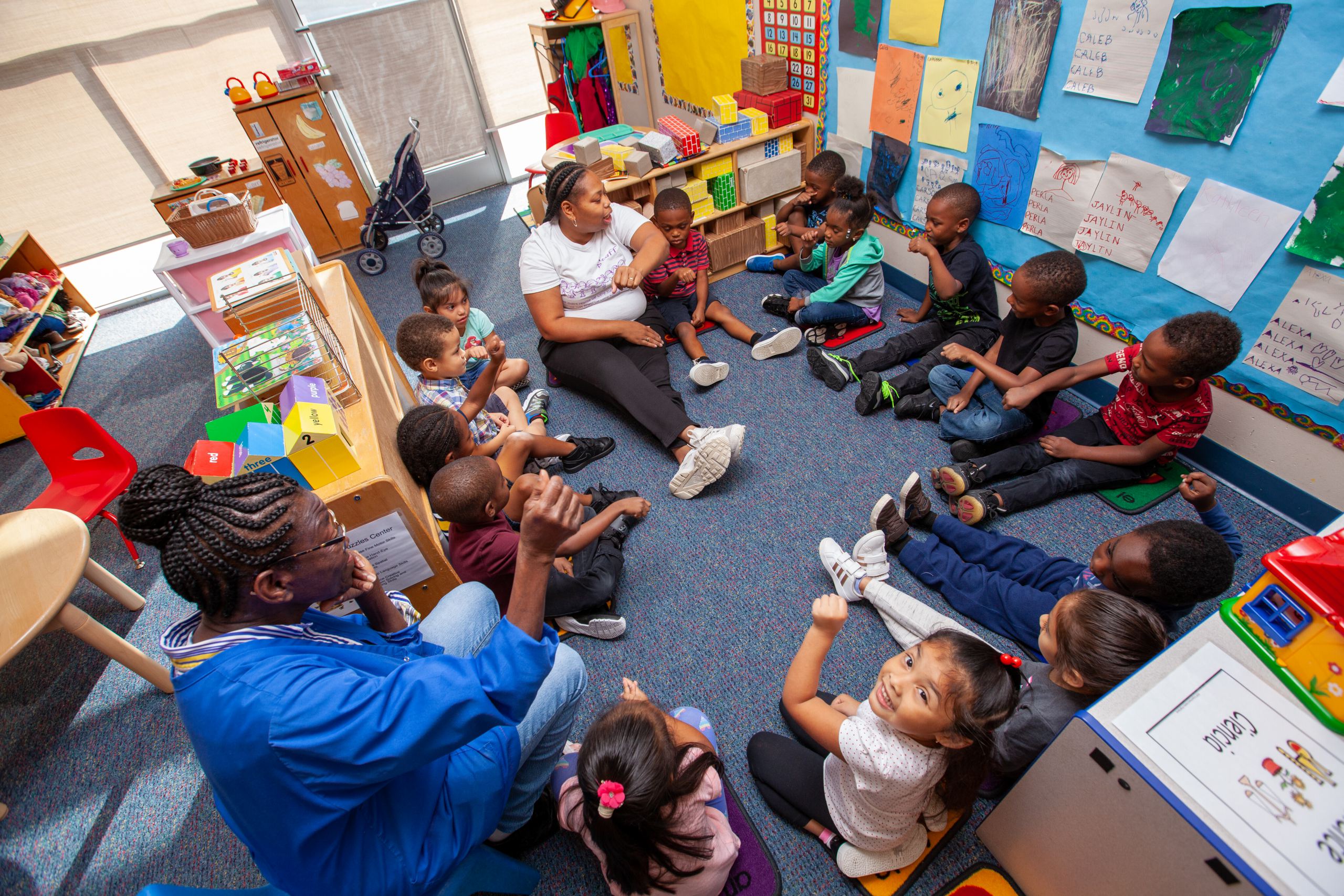Durham PreK Governance Leadership Interview with Dr. Iheoma Iruka
August 24, 2022
Dr. Iruka is a Research Professor in the Department of Public Policy at the University of North Carolina at Chapel Hill, a Fellow at the Frank Porter Graham Child Development Institute, and the founding Director of the Equity Research Action Coalition. She was interviewed for this post in February 2022.
 How long have you been a member of the Durham PreK Governance Committee, and what is your current leadership role?
How long have you been a member of the Durham PreK Governance Committee, and what is your current leadership role?
When I was living in Nebraska working for the University of Nebraska, I was part of Durham’s Community Early Education/Preschool Task Force, which started in 2016 and was a precursor to the Durham Pre-K Governance Committee. I moved back to North Carolina to work for the University of North Carolina and have been part of the Governance Committee since the first official meeting in November 2018. I was voted as Chair in July of 2019.
How did you decide to be part of the task force and what inspired you to take the position of chair?
I had lived in Durham before moving to Nebraska for a few years. When Donna Marie Winn and Linda Chappel asked me to be part of the task force, I said I didn’t mind. I engaged with them as much as I could, and it was actually really fun to be connected to North Carolina while I was living in Nebraska. It worked out well that when I came back, I felt so connected.
Everybody has a voice, right? The chair’s job is as a facilitator, and my goal is to work with the team and figure out the priorities. Our central goal is to make sure we have a strong, well-qualified, well compensated workforce, because we believe that's what's going to get us eventually to a universal model. That means being accessible to all in Durham with a particular attention to those who have lower income who live in particularly disadvantaged communities and settings.
The lens I take is very consistent with the Governance Committee and our goals. You have to make really hard decisions to make sure we can pay teachers at a level that is commensurate with their ability, their talents, and what they are doing as brain builders of our young people.
It's a pleasure when you have a committee with such insightful people, from the Durham County Manager’s Office, Moms Rising, childcare providers, Durham’s Partnership for Children, Head Start, and others. At the end of the day, my job is actually easy because we have really committed people who have been working on these issues for a long time.
You’ve spent more than two decades studying and working in research, education, and public policy, with a particular emphasis on racial equity. You note that the way the early childhood field measures success has long centered white voices and that it’s vitally important that the perspectives, experiences, and voices of people of color are represented in the way success is measured. What does and can the Durham PreK program do to ensure the program develops with racial equity at its core?
No matter where I've been, this has always been an important issue. You want to make sure the foundation that you're building is going to be strong, that you know what your vision and goal is, and for me, the issue of racial equity is always in there. We had to look at a map of Durham and think about who qualifies for priority, where the providers are who need support, where the families are who have fewer options in terms of high-quality programming. The way we have prioritized is to make room for those who we need to be sure have access to what we consider high quality, especially people of color, people living in poverty.
It’s also making sure that the workforce in Durham who’s providing care to Black children, Latino children, children who are living in poverty, are not forgotten. It’s making sure that we are paying them commensurate with the public schools. It may be a little different in Durham, but in general, in the schools, the workforce is mainly white women. We need to make sure we’re not perpetuating wage inequity that seems to exist even within early childhood.
It's really thinking through the question of what is quality, for whom, and under what conditions? Right , we have CLASS measures [Classroom Assessment Scoring System®] that we consider the “gold standard” but we know the creators of these measures are having to figure out, “Is this measure silencing different ways of interacting? Is it penalizing, for example, Black people who may have different ways that they speak?” There is some examination happening with both the CLASS measure, which is one of our standards of quality, as well as the ECERS [Early Childhood Environment Rating Scale] and other measures. I think that as the field is changing, eventually, some of the things that go into Durham PreK will need to be adjusted.
Even thinking about our child outcomes. What is success? Because even when we have our standard measures of language or social-emotional development, we need to examine whether these are measuring the full competencies of our Latino children, our dual language children, our Black children. What does it mean for children to be prepared for success in school and life? And whose lens are we using? I think eventually, those conversations will come, but I feel like right now we're building the infrastructure. And we do see a lot of progress happening around issues of equity, racial equity, in particular. I think some of the things that are happening nationally are going to flow into the conversation of what this means for Durham PreK specifically.
 You spoke about the ECERS and CLASS measures potentially being influenced mostly by white voices or not being inclusive of people of color. Do you feel like ECERS and CLASS are getting the attention they need to be able to incorporate the voices of people of color?
You spoke about the ECERS and CLASS measures potentially being influenced mostly by white voices or not being inclusive of people of color. Do you feel like ECERS and CLASS are getting the attention they need to be able to incorporate the voices of people of color?
I would say yes. Obviously, working at UNC, we will be looking to see to what extent there are gaps in terms of what is captured on the ECERS. We need to look at what are the assets of people of color – our Latino, our Black, our indigenous people – that are missing, because that has implications downstream. I’ve worked with CLASS a bit, too. Observers train to reliability, so you have the tool, and you have the individual, but how you see something is tinged by your lived experience. The measurement developers have to think about how the tools can be adjusted so they’re not just limited to the white, normative ways of being.
I'm one of the co-developers of a measure around equitable socio-cultural interactions that looks at how home culture and life are embedded in the classroom interactions, how we challenge the status quo knowledge, how we provide equitable opportunities for children, particularly with a focus on racially and linguistically minoritized populations. It looks at how we are centering their lens as opposed to the average, and at how they are experiencing the classroom interactions. With other gold standard measures, we want to ask “how do you make sure that your tool is sensitive to construct that you may have missed?” but more importantly, “how do you hire and train observers to be a bit more aware of their own experiences and identities and how those may influence how they rate a teacher, a classroom etc.”
The change may take a couple of years to figure out, but there are things coming out, like Trust for Learning did a paper to lay out other options of quality measures and how equity can be built into our systems. These don’t have to supplant CLASS and ECERS, but it's a complimentary feature that could get us closer to what we want to consider equitable interactions within the classrooms.
If Durham PreK is successful, what about the early childhood landscape in Durham and in North Carolina might look different in the coming years?
I feel like if Durham is successful, first, we will have access that is not predetermined based on what part of Durham you live in. Also, I hope success helps us say that whether you’re in a school setting, a home setting, center based, nonprofit, no matter the auspices, that we’ll provide a similar level of quality across the board, while also respecting and valuing that certain settings provide different unique things. I'm also hoping is that the approaches we have available – Montessori or Reggio-inspired – are also part of our Head Start, our traditional childcare, school-based. I hope what happens is that we have a rich tapestry in our early childhood ecosystem.
At the end of it, PreK is, theoretically, only one year. It is not good enough and is a little too late. What I hope is that the PreK space eventually is much more expansive. I hope Pre-K provides the concept that if we can stabilize and pay well and have really high-quality, rigorously trained teachers who know how to teach your four-year-olds, then we can create that for infants and toddlers, for our three-year-olds. It will mean having a much larger ecosystem that says no matter the auspices or setting, this is doable. We can create it with a diverse, well-compensated workforce and place an important value on making sure that families and children get the high quality care they need. I see PreK almost as a slice of that ecosystem. My grander vision is that we need to be creating that ecosystem, and we're walking there in phases.
 What do you see as the greatest challenge to Durham’s universal preschool program and the avenues available to address that challenge?
What do you see as the greatest challenge to Durham’s universal preschool program and the avenues available to address that challenge?
I think the greatest challenge is probably going to be around who decides to be part of a universal system. Some people think if a program is subsidized by the state or federal government, that it’s for poor kids and that there are other programs for more privileged families. For me, it's going to be figuring out how to bring together a bifurcated system. The evidence is still emerging, but we know that the more children have diverse experiences – economically, racially, ethnically – that it bodes well for every single child. For me, it’s figuring out how to not have these segregated settings. There's nothing wrong when you do have, say, a Black majority or Latino majority community and programming, but it's when there's intentional segregation, exclusion of access to resources and money and workforce, that positions our communities to not have the best of the best.
It’s also figuring out how we make sure that while we're attending to universal access we also attend to quality. This is one we've seen in other states and cities. Boston has universal access, but you still find Black children in lower quality care in this universal system. I think that's going to continue to be the challenge in Durham. I think by making sure that we're all aware of it we can be figuring out what could be adjusted, how we could maybe even incentivize some of that cross pollination. This is probably something that we'll have to really attend to, because the pattern shows itself in every single major city and every single state that has a level of universal access. This requires that our communities understand the value of these integrations in some ways. I think it'll take some work not just in the early childhood space, but also in the larger community and county space.
What is the greatest promise Durham PreK holds for both Durham’s children and for the larger early childhood field?
People sometimes oversell PreK and expect it to close the achievement gap. That is not what we see. What I would say, in reality, is that at the minimum, I think Durham PreK could tell us what it costs to provide quality care and make it accessible. That means being able to pay for a high-quality workforce that we are not only compensating well but also valuing as part of the larger fabric of education. I'm hoping Durham PreK shows that we are able to pay commensurate with our K-12 system regardless of the setting. We need to know what it takes to pay and retain a teacher of high caliber.
It can also show us to what extent universal helps to reduce disparities in access to quality. That can tell us a lot of things, whether on the early childhood side or in other sectors – the health sector, the K-12 sector – it can give us other information. I hope that it’s a space where we are activating universal through an equity lens that prioritizes people who need it more. It’s important that people feel like those who are who often left behind are going to be provided with high quality access to what we think may be beneficial.
For me, it’s not about the scores or the third-grade reading level. I think we're going to change the ecosystem to ensure that your race, your place, your zip code doesn't determine what kind of quality you get and that nobody loses out. We're trying to correct the wrongs of inequitable access and inequitable experiences.
So the promise of PreK isn't PreK; it's for PreK to be a model and a way to expand access, quality and compensation?
That's right. Hopefully, it’s at least an example. Of course, we still need to do evaluation and continue to find out how our workforce is feeling, how families are feeling about their options. The more information we have about access and success and retention of educators, that tells us something. Hopefully it’s a model for both North Carolina and for the larger field.
Thank you so much for all of this. It's really nice to hear you speak about Durham PreK with so much passion.
No, I'm fortunate. The teachers and the providers are doing the heavy lifting. I’m just glad to help support and stabilize and create a much stronger ecosystem for our children.
Stay tuned for future issues of the Durham PreK Governance Leadership Interview series!